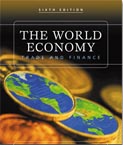As store shelves go bare, Kremlin whitewashes credit crisis
 Moscow - Nothing could be a more visual throwback to the scarcity of Soviet days then the yawning bare shelves at some of Moscow's small grocery chains this week.
Moscow - Nothing could be a more visual throwback to the scarcity of Soviet days then the yawning bare shelves at some of Moscow's small grocery chains this week.
Kremlin critics have even voiced hope that such - so far limited - signs of economic crisis could turn the populace against former president-turned-premier Vladimir Putin.
"It's the crisis," affirmed a sales girl at grocer Samokhval behind a glowing refrigerated counter empty of all but frozen veggies. "They haven't stopped paying me yet, but it's all over the papers - the victims of the crisis."
With that she held up a tabloid expose of affected oligarchs headlined "The Rich Are Crying" in daily Zhizn.
But the shortages are not widespread and a Kremlin directive to avoid dramatizing the crisis looks to have paradoxically improved the public's faith in their economy despite the global squeeze.
State-pollster VTsIOM found 57 per cent of Russians felt the economic outlook was positive, up from 53 per cent in July. One quarter of those polled were unaware of the crisis.
Samokhval and Mosmart, another supermarket chain, are among the small- and medium-sized businesses at a virtual halt as they are unable to get credit or refinance their debt. In short, suppliers have stopped delivering.
"Operators in Russia are freezing all development projects where the concrete (foundations) have not yet been laid," said Tatiana Kuchinskaya, head of retail consulting at realtor Colliers International.
Customers like Marina Kholodova are noticing. A pensioner, Kholdova was searching in vain for salt no longer in stock at one of Samokhval's 60 stores in south-west Moscow. "Are they closing? It's something special, you don't see this in other stores."
But today's situation remains a far cry from the dire days of food coupons and bread queues.
The few products left on the shelves are luxury imports, like 30- dollar Italian pastas. Their presence testifies to how deeply Russia's economy has changed since the penury of the 1990s. Their prices, which have so far failed to drive off avid consumers in what is billed as the world's most expensive city, are also a sign of the changes.
Kholodova shrugged off the financial crisis as "only rumours."
The Kremlin has ordered media to avoid using the words "crisis" and "collapse" in reference to Russian stock hits.
"They advised 'falling' be replaced with the more neutral term 'decreasing'" said Vladimir Varfolomeyev, deputy editor at radio Ekho Moskvye.
It's been a different story in the print press. State-run newspaper Izvestia told Russians to hide three months worth of cash under their mattresses.
Popular daily Tvoi Den on Friday published a list of self- preservation tips: Don't change your place of work, first hires are often first fires; don't buy real estate, prices may still fall; buy gold.
Russian President Dmitry Medvedev has couched the crisis as an illness exported by the West - one that Russia is better prepared to ride out than other countries thanks to Russia's massive sovereign wealth fund, which has been filled by years of rising oil prices.
But with a recent drop in oil prices, energy firms Rosneft and Lukoil are among rich companies lining up for government credits. Moscow's bourses have lost 70 per cent of their value from peaks in May.
Kremlin critics say the government's planned 170 billion dollars in loans will be handed out based on political ties. Furthermore, they say it will only boost inflation, already closing in on 15 per cent.
But shoppers staring at the empty store racks Friday mainly shrugged.
"Of course, it's bothersome. I wanted to buy water - just plain old mineral water," Lev Nikitin, 50, a professor of physical chemistry said. Instead, he was faced with a choice of expensive, small glass bottles of imported water.
"It's very different than in the 1990s. Now we are part of the world economy, it would be very strange if we weren't affected. If there is less in other places, there will be less here," he said with equanimity.
"Consumers haven't felt the effects yet, only bankers understand what is to come ... but there is a lot of inertia in the retail sector and we do not expect a correction until after new years," said Kuchinskaya of Colliers International. (dpa)